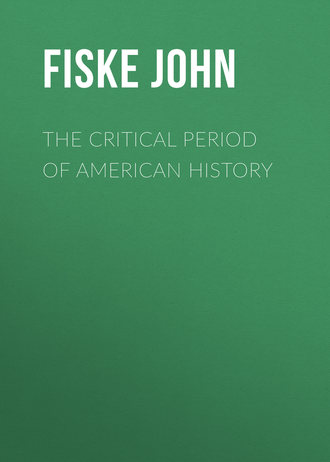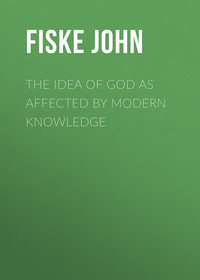 полная версия
полная версияThe Critical Period of American History
Origin of the senates.
In addition to this House of Representatives all the legislatures except those of Pennsylvania and Georgia contained a second or upper house known as the Senate. The origin of the senate is to be found in the governor's council of colonial times, just as the House of Lords is descended from the Witenagemot or council of great barons summoned by the Old-English kings. The Americans had been used to having the acts of their popular assemblies reviewed by a council, and so they retained this revisory body as an upper house. A higher property qualification was required than for membership of the lower house, and, except in New Hampshire, Massachusetts, and South Carolina, the term of service was longer. In Maryland senators sat for five years, in Virginia and New York for four years, elsewhere for two years. In some states they were chosen by the people, in others by the lower house. In Maryland they were chosen by a college of electors, thus affording a precedent for the method of electing the chief magistrate of the union under the Federal Constitution.
Governors viewed with suspicion.
Governors were unpopular in those days. There was too much flavour of royalty and high prerogative about them. Except in the two republics of Rhode Island and Connecticut, American political history during the eighteenth century was chiefly the record of interminable squabbles between governors and legislatures, down to the moment when the detested agents of royalty were clapped into jail, or took refuge behind the bulwarks of a British seventy-four. Accordingly the new constitutions were very chary of the powers to be exercised by the governor. In Pennsylvania and Delaware, in New Hampshire and Massachusetts, the governor was at first replaced by an executive council, and the president of this council was first magistrate and titular ruler of the state. His dignity was imposing enough, but his authority was merely that of a chairman. The other states had governors chosen by the legislatures, except in New York where the governor was elected by the people. No one was eligible to the office of governor who did not possess a specified amount of property. In most of the states the governor could not be reëlected, he had no veto upon the acts of the legislature, nor any power of appointing officers. In 1780, in a new constitution drawn up by James Bowdoin and the two Adamses, Massachusetts led the way in the construction of a more efficient executive department. The president was replaced by a governor elected annually by the people, and endowed with the power of appointment and a suspensory veto. The first governor elected under this constitution was John Hancock. In 1783 New Hampshire adopted a similar constitution. In 1790 Pennsylvania added an upper house to its legislature, and vested the executive power in a governor elected by the people for a term of three years, and twice reëligible. He was intrusted with the power of appointment to offices, with a suspensory veto, and with the royal prerogative of reprieving or pardoning criminals. In 1792 similar changes were made in Delaware. In 1789 Georgia added the upper house to its legislature, and about the same time in several states the governor's powers were enlarged.
Thus the various state governments were repetitions on a small scale of what was then supposed to be the triplex government of England, with its King, Lords, and Commons. The governor answered to the king with his dignity curtailed by election for a short period, and by narrowly limited prerogatives. The senate answered to the House of Lords, except in being a representative and not a hereditary body. It was supposed to represent more especially that part of the community which was possessed of most wealth and consideration; and in several states the senators were apportioned with some reference to the amount of taxes paid by different parts of the state. The senate of New York, in direct imitation of the House of Lords, was made a supreme court of errors. On the other hand, the assembly answered to the House of Commons, save that its power was really limited by the senate as the power of the House of Commons is not really limited by the House of Lords. But this peculiarity of the British Constitution was not well understood a century ago; and the misunderstanding, as we shall hereafter see, exerted a very serious influence upon the form of our federal government, as well as upon the constitutions of the several states.
The judiciary.
In all the thirteen states the common law of England remained in force, as it does to this day save where modified by statute. British and colonial statutes made prior to the Revolution continued also in force unless expressly repealed. The system of civil and criminal courts, the remedies in common law and equity, the forms of writs, the functions of justices of the peace, the courts of probate, all remained substantially unchanged. In Pennsylvania, Delaware, and New Jersey, the judges held office for a term of seven years; in all the other states they held office for life or during good behaviour. In all the states save Georgia they were appointed either by the governor or by the legislature. It was Georgia that in 1812 first set the pernicious example of electing judges for short terms by the people,1– a practice which is responsible for much of the degradation that the courts have suffered in many of our states, and which will have to be abandoned before a proper administration of justice can ever be secured.
The limited suffrage.
In bestowing the suffrage, the new constitutions were as conservative as in all other respects. The general state of opinion in America at that time, with regard to universal suffrage, was far more advanced than the general state of opinion in England, but it was less advanced than the opinions of such statesmen as Pitt and Shelburne and the Duke of Richmond. There was a truly English irregularity in the provisions which were made on this subject. In New Hampshire, Pennsylvania, Delaware, and South Carolina, all resident freemen who paid taxes could vote. In North Carolina all such persons could vote for members of the lower house, but in order to vote for senators a freehold of fifty acres was required. In Virginia none could vote save those who possessed such a freehold of fifty acres. To vote for governor or for senators in New York, one must possess a freehold of $250, clear of mortgage, and to vote for assemblymen one must either have a freehold of $50, or pay a yearly rent of $10. The pettiness of these sums was in keeping with the time when two daily coaches sufficed for the traffic between our two greatest commercial cities. In Rhode Island an unincumbered freehold worth $134 was required; but in Rhode Island and Pennsylvania the eldest sons of qualified freemen could vote without payment of taxes. In all the other states the possession of a small amount of property, either real or personal, varying from $33 to $200, was the necessary qualification for voting. Thus slowly and irregularly did the states drift toward universal suffrage; but although the impediments in the way of voting were more serious than they seem to us in these days when the community is more prosperous and money less scarce, they were still not very great, and in the opinion of conservative people they barely sufficed to exclude from the suffrage such shiftless persons as had no visible interest in keeping down the taxes.
Abolition of primogeniture, entails, and manorial privileges.
At the time of the Revolution the succession to property was regulated in New York and the southern states by the English rule of primogeniture. The eldest son took all. In New Jersey, Pennsylvania, Delaware, and the four New England states, the eldest son took a double share. It was Georgia that led the way in decreeing the equal distribution of intestate property, both real and personal; and between 1784 and 1796 the example was followed by all the other states. At the same time entails were either definitely abolished, or the obstacles to cutting them off were removed. In New York the manorial privileges of the great patroons were swept away. In Maryland the old manorial system had long been dying a natural death through the encroachments of the patriarchal system of slavery. The ownership of all ungranted lands within the limits of the thirteen states passed from the crown not to the Confederacy, but to the several state governments. In Pennsylvania and Maryland such ungranted lands had belonged to the lords proprietary. They were now forfeited to the state. The Penn family was indemnified by Pennsylvania to the amount of half a million dollars; but Maryland made no compensation to the Calverts, inasmuch as their claim was presented by an illegitimate descendant of the last Lord Baltimore.
Steps toward the abolition of slavery and the slave-trade.
The success of the American Revolution made it possible for the different states to take measures for the gradual abolition of slavery and the immediate abolition of the foreign slave-trade. On this great question the state of public opinion in America was more advanced than in England. So great a thinker as Edmund Burke, who devoted much thought to the subject, came to the conclusion that slavery was an incurable evil, and that there was not the slightest hope that the trade in slaves could be stopped. The most that he thought could be done by judicious legislation was to mitigate the horrors which the poor negroes endured on board ship, or to prevent wives from being sold away from their husbands or children from their parents. Such was the outlook to one of the greatest political philosophers of modern times just eighty-two years before the immortal proclamation of President Lincoln! But how vast was the distance between Burke and Bossuet, who had declared about eighty years earlier that "to condemn slavery was to condemn the Holy Ghost!" It was equally vast between Burke and his contemporary Thurlow, who in 1799 poured out the vials of his wrath upon "the altogether miserable and contemptible" proposal to abolish the slave-trade. George III. agreed with his chancellor, and resisted the movement for abolition with all the obstinacy of which his hard and narrow nature was capable. In 1769 the Virginia legislature had enacted that the further importation of negroes, to be sold into slavery, should be prohibited. But George III. commanded the governor to veto this act, and it was vetoed. In Jefferson's first-draft of the Declaration of Independence, this action of the king was made the occasion of a fierce denunciation of slavery, but in deference to the prejudices of South Carolina and Georgia the clause was struck out by Congress. When George III. and his vetoes had been eliminated from the case, it became possible for the states to legislate freely on the subject. In 1776 negro slaves were held in all the thirteen states, but in all except South Carolina and Georgia there was a strong sentiment in favour of emancipation. In North Carolina, which contained a large Quaker population, and in which estates were small and were often cultivated by free labour, the pro-slavery feeling was never so strong as in the southernmost states. In Virginia all the foremost statesmen – Washington, Jefferson, Lee, Randolph, Henry, Madison, and Mason – were opposed to the continuance of slavery; and their opinions were shared by many of the largest planters. For tobacco-culture slavery did not seem so indispensable as for the raising of rice and indigo; and in Virginia the negroes, half-civilized by kindly treatment, were not regarded with horror by their masters, like the ill-treated and ferocious blacks of South Carolina and Georgia. After 1808 the policy and the sentiments of Virginia underwent a marked change. The invention of the cotton-gin, taken in connection with the sudden and prodigious development of manufactures in England, greatly stimulated the growth of cotton in the ever-enlarging area of the Gulf states, and created an immense demand for slave-labour, just at the time when the importation of negroes from Africa came to an end. The breeding of slaves, to be sold to the planters of the Gulf states, then became such a profitable occupation in Virginia as entirely to change the popular feeling about slavery. But until 1808 Virginia sympathized with the anti-slavery sentiment which was growing up in the northern states; and the same was true of Maryland. Emancipation was, however, much more easy to accomplish in the north, because the number of slaves was small, and economic circumstances distinctly favoured free labour. In the work of gradual emancipation the little state of Delaware led the way. In its new constitution of 1776 the further introduction of slaves was prohibited, all restraints upon emancipation having already been removed. In the assembly of Virginia in 1778 a bill prohibiting the further introduction of slaves was moved and carried by Thomas Jefferson, and the same measure was passed in Maryland in 1783, while both these states removed all restraints upon emancipation. North Carolina was not ready to go quite so far, but in 1786 she sought to discourage the slave-trade by putting a duty of £5 per head on all negroes thereafter imported. New Jersey followed the example of Maryland and Virginia. Pennsylvania went farther. In 1780 its assembly enacted that no more slaves should be brought in, and that all children of slaves born after that date should be free. The same provisions were made by New Hampshire in its new constitution of 1783, and by the assemblies of Connecticut and Rhode Island in 1784. New York went farther still, and in 1785 enacted that all children of slaves thereafter born should not only be free, but should be admitted to vote on the same conditions as other freemen. In 1788 Virginia, which contained many free negroes, enacted that any person convicted of kidnapping or selling into slavery any free person should suffer death on the gallows. Summing up all these facts, we see that within two years after the independence of the United States had been acknowledged by England, while the two southernmost states had done nothing to check the growth of slavery, North Carolina had discouraged the importation of slaves; Virginia, Maryland, Delaware, and New Jersey had stopped such importation and removed all restraint upon emancipation; and all the remaining states, except Massachusetts, had made gradual emancipation compulsory. Massachusetts had gone still farther. Before the Revolution the anti-slavery feeling had been stronger there than in any other state, and cases brought into court for the purpose of testing the legality of slavery had been decided in favour of those who were opposed to the continuance of that barbarous institution. In 1777 an American cruiser brought into the port of Salem a captured British ship with slaves on board, and these slaves were advertised for sale, but on complaint being made before the legislature they were set free. The new constitution of 1780 contained a declaration of rights which asserted that all men are born free and have an equal and inalienable right to defend their lives and liberties, to acquire property, and to seek and obtain safety and happiness. The supreme court presently decided that this clause worked the abolition of slavery, and accordingly Massachusetts was the first of American states, within the limits of the Union, to become in the full sense of the words a free commonwealth. Of the negro inhabitants, not more than six thousand in number, a large proportion had already for a long time enjoyed freedom; and all were now admitted to the suffrage on the same terms as other citizens.
Progress toward freedom in religion.
By the revolutionary legislation of the states some progress was also effected in the direction of a more complete religious freedom. Pennsylvania and Delaware were the only states in which all Christian sects stood socially and politically on an equal footing. In Rhode Island all Protestants enjoyed equal privileges, but Catholics were debarred from voting. In Massachusetts, New Hampshire, and Connecticut, the old Puritan Congregationalism was the established religion. The Congregational church was supported by taxes, and the minister, once chosen, kept his place for life or during good behaviour. He could not be got rid of unless formally investigated and dismissed by an ecclesiastical council. Laws against blasphemy, which were virtually laws against heresy, were in force in these three states. In Massachusetts, Catholic priests were liable to imprisonment for life. Any one who should dare to speculate too freely about the nature of Christ, or the philosophy of the plan of salvation, or to express a doubt as to the plenary inspiration of every word between the two covers of the Bible, was subject to fine and imprisonment. The tithing-man still arrested Sabbath-breakers and shut them up in the town-cage in the market-place; he stopped all unnecessary riding or driving on Sunday, and haled people off to the meeting-house whether they would or not. Such restraints upon liberty were still endured by people who had dared and suffered so much for liberty's sake. The men of Boston strove hard to secure the repeal of these barbarous laws and the disestablishment of the Congregational church; but they were outvoted by the delegates from the rural towns. The most that could be accomplished was the provision that dissenters might escape the church-rate by supporting a church of their own. The nineteenth century was to arrive before church and state were finally separated in Massachusetts. The new constitution of New Hampshire was similarly illiberal, and in Connecticut no change was made. Rhode Island nobly distinguished herself by contrast when in 1784 she extended the franchise to Catholics.
In the six states just mentioned the British government had been hindered by charter, and by the overwhelming opposition of the people, from seriously trying to establish the Episcopal church. The sure fate of any such mad experiment had been well illustrated in the time of Andros. In the other seven states there were no such insuperable obstacles. The Church of England was maintained with languid acquiescence in New York. By the Quakers and Presbyterians of New Jersey and North Carolina, as well as in half-Catholic, half-Puritan Maryland, its supremacy was unwillingly endured; in the turbulent frontier commonwealth of Georgia it was accepted with easy contempt. Only in South Carolina and Virginia had the Church of England ever possessed any real hold upon the people. The Episcopal clergy of South Carolina, men of learning and high character, elected by their own congregations instead of being appointed to their livings by a patron, were thoroughly independent, and in the late war their powerful influence had been mainly exerted in behalf of the patriot cause. Hence, while they retained their influence after the close of the war, there was no difficulty in disestablishing the church. It felt itself able to stand without government support. As soon as the political separation from England was effected, the Episcopal church was accordingly separated from the state, not only in South Carolina, but in all the states in which it had hitherto been upheld by the authority of the British government; and in the constitutions of New Jersey, Georgia, and the two Carolinas, no less than in those of Delaware and Pennsylvania, it was explicitly provided that no man should be obliged to pay any church rate or attend any religious service save according to his own free and unhampered will.
Church and state in Virginia.
The case of Virginia was peculiar. At first the Church of England had taken deep root there because of the considerable immigration of members of the Cavalier party after the downfall of Charles I. Most of the great statesmen of Virginia in the Revolution – such as Washington, Madison, Mason, Jefferson, Pendleton, Henry, the Lees, and the Randolphs – were descendants of Cavaliers and members of the Church of England. But for a long time the Episcopal clergy had been falling into discredit. Many of them were appointed by the British government and ordained by the Bishop of London, and they were affected by the irreligious listlessness and low moral tone of the English church in the eighteenth century. The Virginia legislature thought it necessary to pass special laws prohibiting these clergymen from drunkenness and riotous living. It was said that they spent more time in hunting foxes and betting on race-horses than in conducting religious services or visiting the sick; and according to Bishop Meade, many dissolute parsons, discarded from the church in England as unworthy, were yet thought fit to be presented with livings in Virginia. To this general character of the clergy there were many exceptions. There were many excellent clergymen, especially among the native Virginians, whose appointment depended to some extent upon the repute in which they were held by their neighbours. But on the whole the system was such as to illustrate all the worst vices of a church supported by the temporal power. The Revolution achieved the discomfiture of a clergy already thus deservedly discredited. The parsons mostly embraced the cause of the crown, but failed to carry their congregations with them, and thus they found themselves arrayed in hopeless antagonism to popular sentiment in a state which contained perhaps fewer Tories in proportion to its population than any other of the thirteen.
Madison and the Religious Freedom Act, 1785.
At the same time the Episcopal church itself had gradually come to be a minority in the commonwealth. For more than half a century Scotch and Welsh Presbyterians, German Lutherans, English Quakers, and Baptists, had been working their way southward from Pennsylvania and New Jersey, and had settled in the fertile country west of the Blue Ridge. Daniel Morgan, who had won the most brilliant battle of the Revolution, was one of these men, and sturdiness was a chief characteristic of most of them. So long as these frontier settlers served as a much-needed bulwark against the Indians, the church saw fit to ignore them and let them build meeting-houses and carry on religious services as they pleased. But when the peril of Indian attack had been thrust westward into the Ohio valley, and these dissenting communities had waxed strong and prosperous, the ecclesiastical party in the state undertook to lay taxes on them for the support of the Church of England, and to compel them to receive Episcopal clergymen to preach for them, to bless them in marriage, and to bury their dead. The immediate consequence was a revolt which not only overthrew the established church in Virginia, but nearly effected its ruin. The troubles began in 1768, when the Baptists had made their way into the centre of the state, and three of their preachers were arrested by the sheriff of Spottsylvania. As the indictment was read against these men for "preaching the gospel contrary to law," a deep and solemn voice interrupted the proceedings. Patrick Henry had come on horseback many a mile over roughest roads to listen to the trial, and this phrase, which savoured of the religious despotisms of old, was quite too much for him. "May it please your worships," he exclaimed, "what did I hear read? Did I hear an expression that these men, whom your worships are about to try for misdemeanour, are charged with preaching the gospel of the Son of God!" The shamefast silence and confusion which ensued was of ill omen for the success of an undertaking so unwelcome to the growing liberalism of the time. The zeal of the persecuted Baptists was presently reinforced by the learning and the dialectic skill of the Presbyterian ministers. Unlike the Puritans of New England, the Presbyterians were in favour of the total separation of church from state. It was one of their cardinal principles that the civil magistrate had no right to interfere in any way with matters of religion. By taking this broad ground they secured the powerful aid of Thomas Jefferson, and afterwards of Madison and Mason. The controversy went on through all the years of the Revolutionary War, while all Virginia, from the sea to the mountains, rang with fulminations and arguments. In 1776 Jefferson and Mason succeeded in carrying a bill which released all dissenters from parish rates and legalized all forms of worship. At last in 1785 Madison won the crowning victory in the Religious Freedom Act, by which the Church of England was disestablished and all parish rates abolished, and still more, all religious tests were done away with. In this last respect Virginia came to the front among all the American states, as Massachusetts had come to the front in the abolition of negro slavery. Nearly all the states still imposed religious tests upon civil office-holders, from simply declaring a general belief in the infallibleness of the Bible to accepting the doctrine of the Trinity. The Virginia statute, which declared that "opinion in matters of religion shall in nowise diminish, enlarge, or affect civil capacities," was translated into French and Italian, and was widely read and commented on in Europe.









